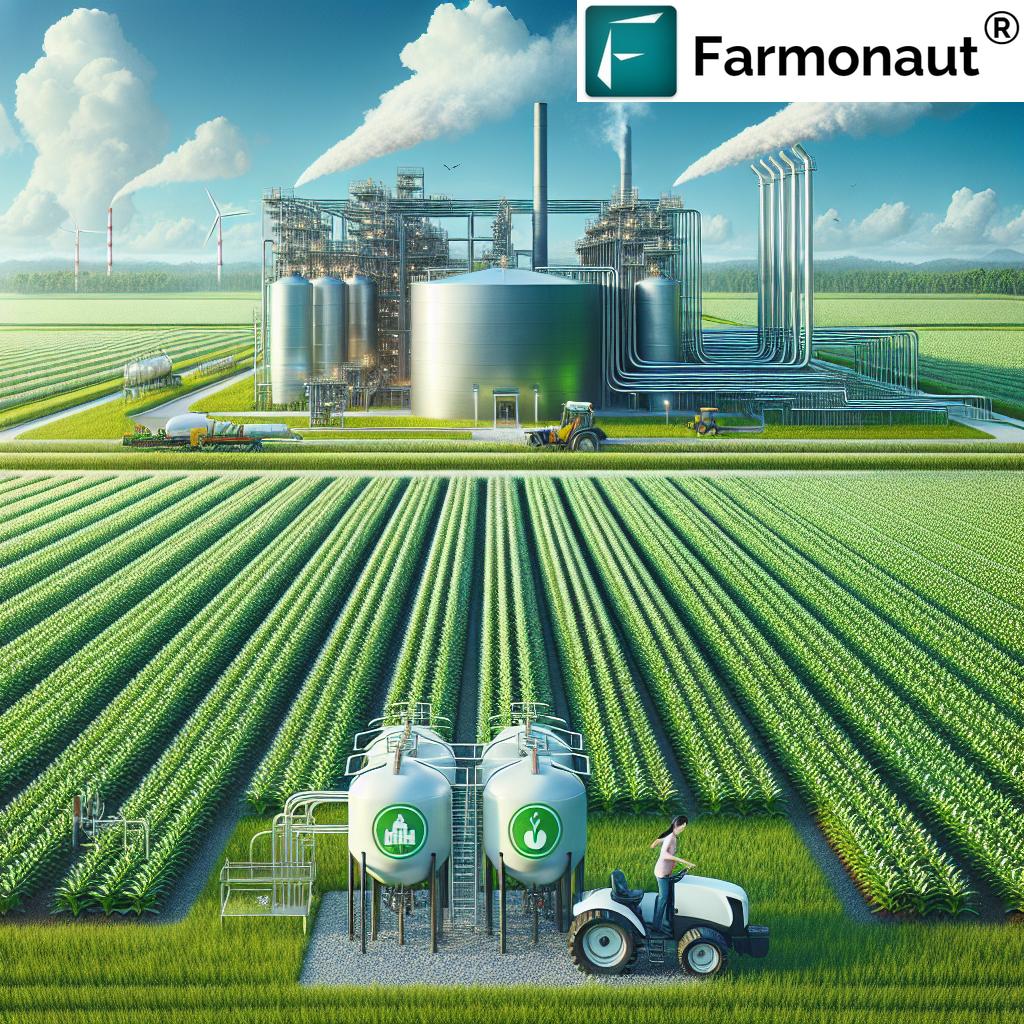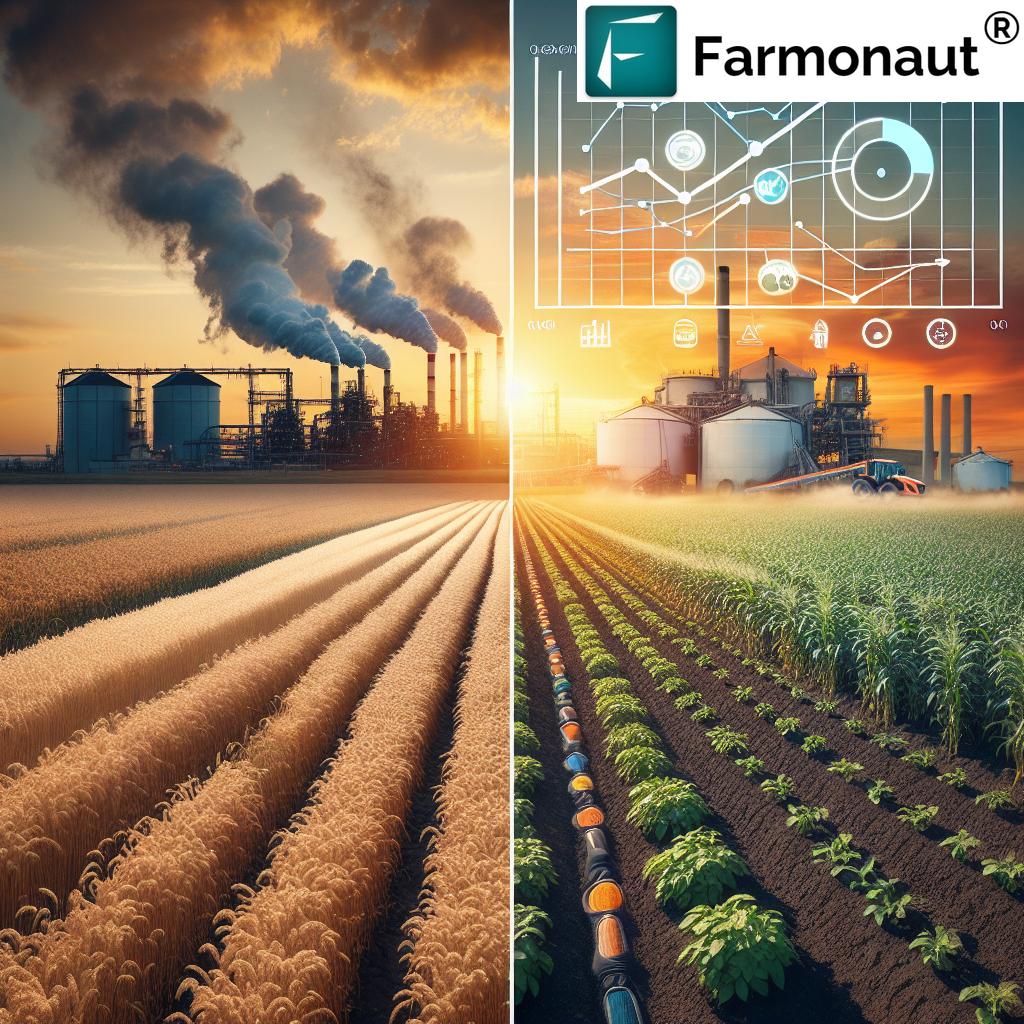Revolutionizing Saskatchewan Agriculture: Low-Carbon Nitrogen Fertilizer Facility to Boost Sustainable Farming Practices
“Low-carbon nitrogen fertilizer facilities can reduce agricultural carbon footprints by up to 30% compared to traditional methods.”
Welcome to the future of sustainable agriculture! We at Farmonaut are excited to share groundbreaking developments in the world of low-carbon fertilizer production and environmentally conscious farming practices. Today, we’re diving deep into the revolutionary advancements taking place in Saskatchewan, Canada, where a new low-carbon nitrogen fertilizer facility is set to transform the agricultural landscape.

The Dawn of Sustainable Fertilizer Production
In a significant move towards sustainable agricultural inputs, Genesis Fertilizers, a startup focused on low-carbon fertilizer production, has partnered with DL Engineering & Constructions (DL E&C) to advance Canada’s first proposed low-carbon nitrogen fertilizer facility in Belle Plaine, Saskatchewan. This collaboration marks a pivotal moment in the journey towards reducing the agricultural carbon footprint and embracing more sustainable farming solutions.
The project, set to commence in December 2023, is not just another industrial development; it’s a beacon of hope for environmentally conscious farming practices. By implementing cutting-edge carbon capture technology in collaboration with Carbonco and enlisting the aid of Whitecap Resources for carbon sequestration, this facility is poised to revolutionize the way we think about fertilizer production and its environmental impact.
Meeting the Growing Demand for Sustainable Agricultural Inputs
The Belle Plaine facility is designed with ambitious goals in mind. It aims to produce approximately 1.1 million metric tonnes per year of nitrogen fertilizers, including urea and ammonium sulfate. This significant output reflects the growing market demand for low-carbon products and sustainable farming solutions. The scale of production has been increased from the initial plan of 700,000 metric tonnes per year, underscoring the urgent need for eco-friendly fertilizers in modern agriculture.
As we at Farmonaut continue to champion precision agriculture and sustainable farming practices through our satellite-based farm management solutions, we’re thrilled to see such large-scale initiatives taking shape. Our web app and mobile applications for Android and iOS complement these advancements by providing farmers with real-time crop health monitoring and AI-based advisory systems.
Innovative Carbon Capture Technology: A Game-Changer for Fertilizer Manufacturing
At the heart of this groundbreaking project lies the implementation of innovative carbon capture technology. This advanced system is designed to significantly reduce the carbon emissions associated with traditional fertilizer production methods. By capturing and sequestering carbon dioxide, the facility aims to minimize its environmental impact while producing essential nutrients for crop production.
The integration of carbon capture technology aligns perfectly with our mission at Farmonaut to promote sustainable agricultural practices. Through our satellite-based monitoring and AI-driven insights, we help farmers optimize their resource use, including fertilizers, to reduce waste and environmental impact. Our API and API Developer Docs enable agricultural businesses to integrate these sustainable practices into their operations seamlessly.
Eco-Friendly Fertilizers: Urea and Ammonium Sulfate Production
The Belle Plaine facility will focus on producing two key nitrogen fertilizers: urea and ammonium sulfate. These products are essential for crop nutrition and play a crucial role in enhancing agricultural productivity. However, what sets this production apart is its low-carbon approach:
- Urea Production: The facility will employ advanced technologies to produce urea with a significantly reduced carbon footprint compared to traditional methods. This low-carbon urea will provide farmers with an environmentally friendly option for nitrogen fertilization.
- Ammonium Sulfate: As another vital nitrogen source, ammonium sulfate production at the facility will also benefit from the carbon capture technology, ensuring a more sustainable manufacturing process.
These eco-friendly fertilizers are set to play a crucial role in reducing the agricultural carbon footprint while maintaining or even improving crop yields. At Farmonaut, we understand the importance of balancing productivity with sustainability, which is why our satellite-based crop health monitoring services help farmers optimize their fertilizer use, ensuring maximum efficiency and minimal environmental impact.

Reshaping Local Fertilizer Supply Chains
One of the most significant impacts of the Belle Plaine facility will be its effect on local fertilizer supply chains. By producing low-carbon fertilizers within Saskatchewan, the project aims to reduce Canada’s dependence on imported nitrogen fertilizers. This localization of production brings several benefits:
- Reduced freight costs for Canadian farmers
- Decreased environmental impact associated with long-distance transportation
- Enhanced supply chain resilience
- Improved accessibility to sustainable agricultural inputs
This shift towards local production aligns with our goals at Farmonaut to support sustainable and efficient agricultural practices. Our blockchain-based traceability solutions can further enhance the transparency and efficiency of these local supply chains, ensuring that farmers have access to verified, sustainable fertilizers.
“Sustainable fertilizer production using carbon capture technology can increase crop yields by 15-20% while reducing environmental impact.”
Farmer Ownership and Economic Resilience
A unique aspect of the Genesis Fertilizers project is its proposition for farmer ownership. The company intends to allocate nearly 75% of production through offtake agreements, ensuring stable demand for its products. This strategy not only supports local farmers but also aims to enhance their economic resilience by providing a reliable supply of essential nutrients for crop production.
The remaining 25% of production will be sold on the spot market, allowing for flexibility in meeting varying demand. This balanced approach to distribution aligns with our mission at Farmonaut to empower farmers with tools and resources that enhance their productivity and sustainability.
Environmental Goals and Economic Impact
The development of the low-carbon nitrogen fertilizer facility in Belle Plaine is not just an industrial project; it’s a step towards meeting Canada’s environmental goals. By reducing the nation’s dependence on imported fertilizers and implementing carbon capture technology, the facility contributes to:
- Lowering the overall carbon footprint of Canadian agriculture
- Meeting national and international climate targets
- Promoting sustainable farming practices on a large scale
- Boosting the local and national economy through job creation and reduced import costs
At Farmonaut, we’re excited to see such initiatives that align with our mission of promoting sustainable agriculture. Our satellite-based farm management solutions, including our web app, complement these efforts by helping farmers optimize their resource use and reduce environmental impact.
Collaboration and Expertise: DL E&C’s Role
The involvement of DL Engineering & Constructions (DL E&C) in this project brings a wealth of experience and expertise to the table. With a track record of successful fertilizer projects, including those for Ma’aden in Saudi Arabia and the Golden Triangle Polymers Project in Texas, DL E&C’s participation ensures that the Belle Plaine facility will be built to the highest standards of efficiency and sustainability.
This collaboration showcases the importance of bringing together diverse expertise to tackle the challenges of sustainable agriculture. At Farmonaut, we similarly leverage cutting-edge technology and industry knowledge to provide farmers with the best tools for sustainable farm management.
The Future of Sustainable Farming
As we look towards the future, the Belle Plaine low-carbon nitrogen fertilizer facility represents a significant milestone in the journey towards more sustainable and environmentally conscious farming practices. This project, set to commence commercial operations by 2029, will likely serve as a model for similar initiatives worldwide.
At Farmonaut, we’re committed to being at the forefront of this agricultural revolution. Our satellite-based crop health monitoring, AI-driven advisory systems, and blockchain-based traceability solutions complement large-scale initiatives like the Belle Plaine facility by providing farmers with the tools they need to make the most of these sustainable inputs.
| Production Aspect | Traditional Method | Low-Carbon Method | Environmental Impact |
|---|---|---|---|
| Carbon Emissions (estimated tons CO2/year) | 1,000,000 | 300,000 | 70% reduction |
| Energy Consumption (estimated kWh/ton) | 1,200 | 900 | 25% reduction |
| Water Usage (estimated gallons/ton) | 1,500 | 1,000 | 33% reduction |
| Production Efficiency (estimated %) | 85% | 92% | 7% improvement |
| Cost of Production (estimated $/ton) | $400 | $450 | 12.5% increase |
| Crop Yield Impact (estimated % increase) | Baseline | 15-20% | Significant improvement |
Conclusion: A Step Towards Sustainable Agriculture
The development of the low-carbon nitrogen fertilizer facility in Belle Plaine, Saskatchewan, marks a significant step towards more sustainable and environmentally conscious farming practices. By combining innovative carbon capture technology with efficient production methods, this project promises to revolutionize the fertilizer industry and contribute to reducing the agricultural carbon footprint.
As we at Farmonaut continue to innovate in the field of precision agriculture and sustainable farming solutions, we’re inspired by initiatives like this that align with our mission. Our satellite-based farm management tools, AI-driven insights, and blockchain traceability solutions complement these large-scale sustainability efforts, empowering farmers to make the most of these advancements.
Together, through technological innovation, sustainable production methods, and data-driven farming practices, we’re paving the way for a more sustainable and productive agricultural future. The Belle Plaine facility is not just a local development; it’s a beacon of hope for sustainable agriculture worldwide, showing that with the right approach, we can meet the growing demand for food while preserving our planet for future generations.
FAQ Section
- What is low-carbon nitrogen fertilizer?
Low-carbon nitrogen fertilizer is produced using methods that significantly reduce greenhouse gas emissions compared to traditional fertilizer manufacturing processes. It often involves carbon capture technology and more efficient production techniques. - How does carbon capture technology work in fertilizer production?
Carbon capture technology in fertilizer production involves capturing CO2 emissions from the manufacturing process before they enter the atmosphere. This captured CO2 can then be stored underground or used in other industrial processes, reducing the overall carbon footprint of fertilizer production. - Will low-carbon fertilizers be more expensive for farmers?
Initially, low-carbon fertilizers may have a slightly higher production cost. However, as technology advances and production scales up, prices are expected to become more competitive. Additionally, potential carbon credits and reduced environmental impact costs may offset any price differences. - How can farmers benefit from using low-carbon fertilizers?
Farmers can benefit from using low-carbon fertilizers in several ways:- Potential access to carbon credits or sustainability incentives
- Meeting increasing consumer demand for sustainably produced food
- Improved soil health and long-term farm sustainability
- Potential yield improvements due to more efficient nutrient uptake
- How does Farmonaut’s technology complement the use of low-carbon fertilizers?
Farmonaut’s satellite-based crop monitoring and AI-driven advisory systems help farmers optimize their fertilizer use, ensuring that low-carbon fertilizers are applied efficiently and effectively. This synergy maximizes the environmental benefits while maintaining or improving crop yields.
Stay tuned to Farmonaut for more updates on sustainable farming practices and agricultural innovations. Together, we’re cultivating a greener future for agriculture!






